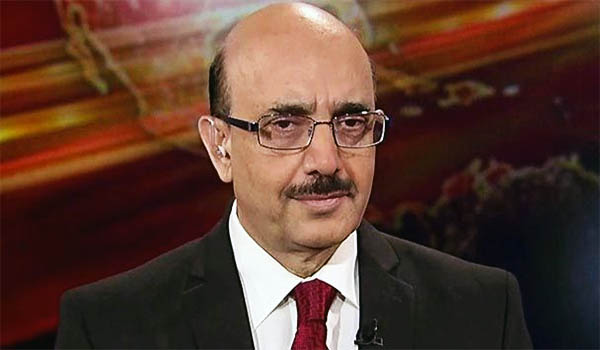Listen to the article
Pakistan’s former Kashmir leader warns of AI-powered disinformation threats to national security
Former president of Azad Jammu and Kashmir, Sardar Masood Khan, has called on Pakistan to strengthen its defenses against the evolving threats of misinformation and disinformation in an era increasingly shaped by artificial intelligence technologies.
Speaking at a seminar hosted by the Centre for Law and Security (CLAS) in Islamabad, Khan drew on his extensive diplomatic background to highlight how modern technology has transformed traditional information warfare. “Disinformation is as old as warfare itself, but artificial intelligence has given it unprecedented reach, speed, and sophistication,” he told attendees at the policy think tank event.
Khan, who chaired the World Summit on the Information Society (WSIS) on Internet Governance in 2005, provided historical context for his concerns. He referenced past conflicts between India and Pakistan and information campaigns surrounding the global war on terrorism as examples of how narrative construction has been integral to national security strategy throughout history.
The digital transformation of information warfare presents unique challenges, according to Khan. “Today, AI-driven content, deep fakes, and algorithmic manipulation have made perception management a battlefield in itself,” he explained. This technological evolution has fundamentally altered how nations must approach strategic communications and defense planning.
The former diplomat carefully distinguished between information warfare and disinformation in his address. He described information warfare as the legitimate process of building national narratives during both peace and conflict, whereas disinformation involves deliberately manipulating facts to achieve strategic objectives.
Khan emphasized the dangerous velocity of modern disinformation: “Disinformation feeds on speed. Before a false story can be corrected, millions have already seen and believed it.” This rapid spread of false information can have serious consequences for national unity and public understanding of complex geopolitical issues.
In outlining potential responses to these challenges, Khan advocated for a comprehensive approach beginning with internal cohesion. “Authentic actions on the ground, systematic narrative-building, and national cohesion from north to south, east to west” form the foundation of effective counter-disinformation strategies, he argued. Khan stressed that fragmented nations are particularly vulnerable to external manipulation campaigns.
The Kashmir leader also addressed Pakistan’s information confrontations with neighboring India, suggesting that Pakistan’s disciplined communications approach has proven more effective than what he characterized as “India’s exaggerated and farcical propaganda.” According to Khan, India’s disinformation efforts during recent tensions were undermined by skepticism from both Indian citizens and international media.
Khan’s warnings come at a critical time for South Asian security dynamics, as artificial intelligence technologies become increasingly accessible to both state and non-state actors. The proliferation of sophisticated AI tools has democratized the ability to create convincing false content, making traditional verification systems inadequate.
Regional experts note that Khan’s concerns reflect growing awareness among security professionals worldwide about information domain vulnerabilities. The India-Pakistan relationship, historically characterized by mutual distrust and competing narratives, provides fertile ground for information operations leveraging new technologies.
For Pakistan, the challenge will be developing robust defensive measures while maintaining credibility in its own communications. As artificial intelligence capabilities continue to advance, distinguishing truth from fabrication will require both technological solutions and public education initiatives to foster critical information literacy among citizens.
Fact Checker
Verify the accuracy of this article using The Disinformation Commission analysis and real-time sources.




8 Comments
Masood Khan’s warning about the dangers of AI-driven disinformation is a wake-up call for Pakistan. Safeguarding national security in the digital age requires a comprehensive, proactive approach.
While disinformation is not a new phenomenon, the technological advancements that enable its rapid dissemination are certainly cause for alarm. Pakistan will need to invest in innovative solutions to stay ahead of these threats.
Agreed, the scale and sophistication of modern disinformation campaigns demand a multifaceted response. Strengthening media literacy and public awareness will be crucial.
Interesting insights from Masood Khan on the evolving disinformation threats facing Pakistan. AI-powered information warfare is a growing challenge that requires robust defense strategies.
Agreed, Pakistan must be proactive in preparing for these sophisticated disinformation tactics. Enhancing cybersecurity and media literacy will be critical.
Khan’s background in diplomacy and internet governance gives him a unique perspective on this issue. Disinformation has long been a weapon, but AI is taking it to new levels of speed and scale.
Yes, the historical context he provides is helpful for understanding how information warfare has evolved. Pakistan will need to stay vigilant and agile to counter these emerging threats.
The challenges posed by AI-powered disinformation are quite concerning, especially for national security. Pakistan must prioritize developing robust defenses to protect its citizens and institutions.